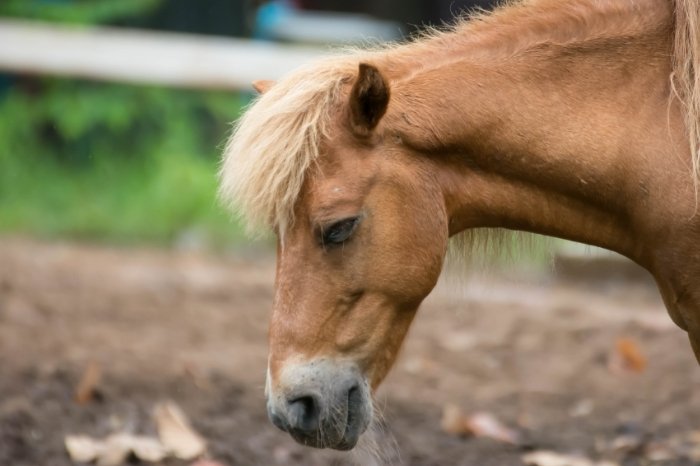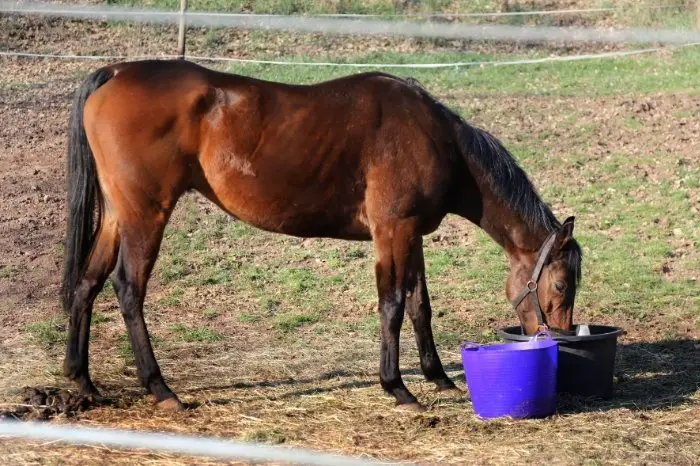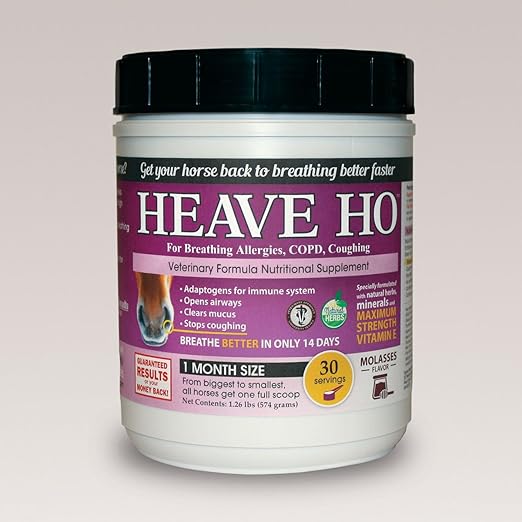Last Updated on March 31, 2022
If you have or know a horse that suffers from heaves you will understand how difficult it is to treat. For many people dealing with heaves in horses, natural remedies can be a huge help. But what is the best treatment for heaves in horses?
Heaves is a long-term respiratory disorder of horses and can be difficult for the horse owner or carer to manage. Let’s take a look at what causes this problem and the best treatments to use.
What Are Heaves In Horses?
The word ‘heaves’ is used to describe a respiratory condition of horses, more commonly known as recurrent airway obstruction (RAO). Horses suffering from heaves will normally have this condition for life, so for the horse owner, the main aim is to reduce the symptom of the disease as much as possible.
A horse suffering with RAO will have a cough, increased respiratory rate, and difficulty breathing when exercised. This can lead to the horse taking large, exaggerated breaths, with flared nostrils and a pronounced line along the side of the abdomen. This is called a ‘heave line’ and is a sign that the horse is not able to breathe in enough air comfortably.

An episode of heaves is normally triggered by a type of allergen, which causes the airways to restrict and tighten. This allergen is normally pollen or dust, although sometimes it is impossible to identify the trigger.
Best Treatment For Heaves In Horses
If your horse has been recently diagnosed with RAO or has had the condition for a long time, your veterinary surgeon will most likely recommend medical treatment. This is often unavoidable if the heaving symptoms are bad, and the medication can quickly bring relief to your horse.
Medications used to treat heaves include anti-inflammatories, which is normally a type of corticosteroid. This will help to reduce swelling and inflammation in the airways. Another medication commonly used is bronchodilators, which open up the airways and allow more air into the lungs. If you know someone who suffers from asthma, these are the same medications that they have in their inhalers!
Medications can be great for quickly reducing the symptoms of RAO, but to prevent the heaves from starting in the first place then changes to the management of the horse are essential. As the condition is normally triggered by pollen or dust, the following changes can make a huge difference.
For horses who react to dust:
- Store hay in a separate barn to your horse
- Switch the bedding to something dust-free, such as chopped paper
- Soak hay and feed in water prior to feeding
- Keep them turned out as much as possible
- Make sure that barns and stables are well-ventilated
For horses who react to pollen:
- Keep them stabled during summer when the pollen count is highest
- Turn out on short pasture; long grass will contain more pollen
- Soak hay and feed in water prior to feeding
But once you’ve got your management sorted, what next? Many horse owners turn to natural remedies for heaves in horses, and some of these can help to reduce the long-term symptoms of this disease. Let’s take a look at the best heaves in horses natural remedies!
Read more information about What Does High Fibrinogen Mean In Horses?
Natural Remedies For Heaves In Horses
As with most natural remedies, it can be difficult to find any which are scientifically proven to work. However, some of these have been used by herbalists for thousands of years and are definitely worth investigating further!
If you’re not sure where to start, then a pre-mixed herbal supplement may be the one for you. Most horse feed supplement manufacturers now make products aimed at different medical conditions, so it should be easy to find one which suits your horse. Many of these supplements have similar ingredients, so it is just a case of finding one which your horse enjoys!
Equine Medical and Surgical Heave Ho 30 Day Molasses 30S
Omega-3 Fatty Acids
If you’re looking for a drug-free treatment, then omega-3 fatty acids are a great place to start! Research has shown that omega-3 fatty acids can help horses to recover faster from RAO, so it can be helpful to add this to your horse’s feed during high-risk periods. Supplements containing omega-3 fatty acids are commonly available.
Marshmallow Leaf (Althea Officinalis)
This herb has been used to treat respiratory disease in humans and animals for centuries. It helps to soothe and moisten the mucous membranes, the delicate tissues which line the respiratory tract.
Licorice Root (Glycyrhiza Glabra)
Licorice has anti-inflammatory effects and will reduce swelling and inflammation of the airways. Using this natural remedy for heaves may help to reduce the dose of veterinary medicines such as corticosteroids. However, licorice root must not be fed to pregnant mares.
Vitamins C & E
Supplements which are high in vitamins C & E have been shown to reducing the severity of respiratory symptoms in horses. This is because of the antioxidant effects of these vital vitamins. Make sure that your horse’s diet contains a good vitamin and mineral supplement if they are at risk of respiratory disorders like RAO.

Garlic
Feeding a garlic supplement can be a controversial subject as if garlic is fed in large quantities, it may be harmful to your horse. However, at lower doses, this strong-smelling allium can help to support the respiratory system. Make sure that you feed a granulated or powdered garlic supplement, and never exceed the recommended dose.
Aromatic Oils
You may be familiar with using aromatic oils to sooth a cough, and they can also be used in the same way for horses! Oils such as eucalyptus, lavender, and pine can help to relieve symptoms. However, thoroughly research the process first as care must be taken when using essential oils.
Summary
As we have learned, horses with heaves have difficulty breathing. This condition can be difficult for the horse owner to manage, and the most important thing is to reduce the horse’s exposure to dust and pollen. Natural remedies such as marshmallow leave and licorice root may also help to relieve the symptoms of this disease.
We’d love to hear about your experiences – does your horse suffer from heaves? Have you tried other natural remedies for heaves in horses? Add a comment below this post and we’ll get back to you!
Can heaves in horses be cured?
Heaves is caused by an allergic reaction, so there is no cure for this condition. But the condition can be managed by keeping the horse in a healthy and allergen free environment. You should also consider using medications to treat the symptoms of heaves if the condition in your horse is severe or his health worsens. Medications can relieve the discomfort and allow horses to breathe more easily. You can also use nutritional supplements that support the immune system and respiratory health to reduce symptoms.
Are heaves contagious?
Heaves is a chronic, non-infectious airway condition of horses. It’s a condition that affects mostly older horses, particularly if they live mainly indoors. Heaves is caused by an allergic reaction that occurs when a horse inhales the dust from the mold (fungus). The fungus grows in moist environments, like the soil, and may be found in hay, bedding, and feed. The symptoms of heaves are similar to those of asthma in people, but horses usually don’t show the same degree of distress. Some horses may just cough or develop a hacking cough, while others may have trouble breathing and a labored, raspy breathing pattern.
Are horse heaves hereditary?
Heaves or Chronic obstructive pulmonary disease (COPD) is characterized by persistent airflow obstruction that interferes with normal breathing. The disorder occurs when the bronchial tubes become narrowed or blocked, making it difficult to breathe out. This can lead to excessive coughing, wheezing, and shortness of breath.
COPD is not hereditary although there are some speculations that it might be inherited. However, despite this still being a controversial topic, it’s mostly accepted that COPD is triggered by environmental factors and is a reaction to them. Known environmental triggers that can cause COPD are dust, mold, and other allergens.
What does a horse with heaves look like?
The initial stage of heaves may include occasional coughing attacks and a nasal discharge. Horses with the advanced form of the heaves will be coughing, flaring the nostrils, wheezing, and having difficulty breathing when at rest. They might not be able to exercise or the exercise might trigger more severe symptoms. Horses might have increased respiratory rate at rest or following exercise, they might produce abnormal lung sounds, and even lose weight. The disease is usually seen in horses that have been stressed, but stress alone does not seem to be the primary cause.
What does broken wind mean in a horse?
“Broken wind” is another expression for the heaves. Heaves are a chronic disorder of the respiratory system of horses and cows, causing difficulty breathing and a wheezy cough. The symptoms get worse if the horse is performing a vigorous exercise, but also sudden weather changes and overfeeding can make the condition worse. Hives can sometimes develop from bronchitis or allergies to grain dust and mold. This may be associated with the feeding your horse dusty or moldy hay. Horses are very sensitive to mold spores. They can cause coughing, hacking, and difficulty breathing. If you see mold on the surface of the hay, do not feed it to your horse.

Kate Chalmers is a qualified veterinary nurse who has specialized in horse care for the vast majority of her career. She has been around horses since she was a child, starting out riding ponies and helping out at the local stables before going on to college to study Horse Care & Management. She has backed and trained many horses during her lifetime and competed in various equestrian sports at different levels.
After Kate qualified as a veterinary nurse, she provided nursing care to the patients of a large equine veterinary hospital for many years. She then went on to teach horse care and veterinary nursing at one of the top colleges in the country. This has led to an in-depth knowledge of the care needs of horses and their various medical ailments, as well as a life-long passion for educating horse owners on how to provide the best possible care for their four-legged friends.
Kate Chalmers BSc (Hons) CVN, Dip AVN (Equine) Dip HE CVN EVN VN A1 PGCE

